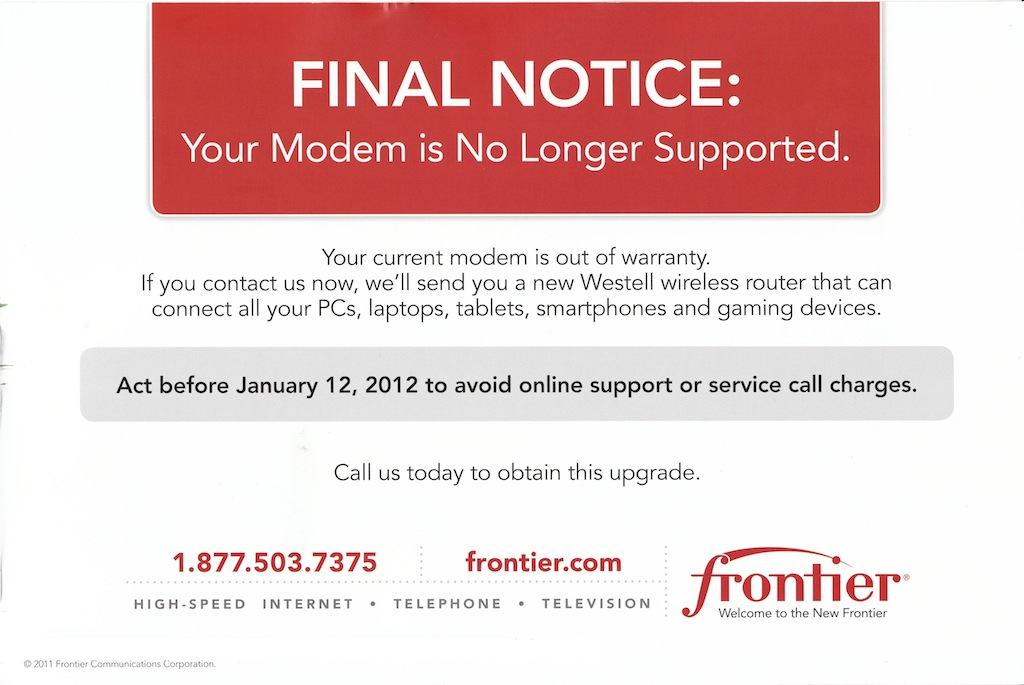“We’re moving away from one-size-fits-all,” admits Jon Gary Herrera, a Texas spokesman for Time Warner Cable, which has introduced a usage-limited plan called “Internet Essentials” that limits customers to a paltry 5GB of usage per month in return for a $5 discount.
Time Warner Cable has learned from its mistakes in 2009, when the company attempted to force usage limits on broadband customers that would have left those seeking an unlimited experience with a broadband bill of $150 a month. After a consumer backlash organized by Stop the Cap!, the company quickly pulled back and put the plans on hold.
After three years, the playbook is off the shelf once again and being dusted off, although the nation’s second largest cable company is taking things a lot more slowly the second time around.
Lesson one: Broadband pricing and usage plan changes must happen gradually and carefully.
The New York Times reports that cable executives privately admit they are working to charge consumer expectations, starting with the notion that “all you can eat” broadband is what customers want or need.
Time Warner telemarketers have begun re-educating consumers when calling to sign up for broadband, now asking them what they do with their Internet connection and suggesting different plans based on their anticipated usage, not their speed expectations.
So far, sources working for Time Warner Cable in South Texas tell Stop the Cap! the plan is not working too well and few customers are interested in the usage-capped “Internet Essentials” plan that has been marketed in several markets in the state.

“Overage charges will be capped at $75 per month. That means that for $150 per month customers could have virtually unlimited usage at Turbo speeds.” — (April 9, 2009) Landel Hobbs, then chief operating officer of Time Warner Cable
“Customers really are not interested in understanding what their usage level is and don’t see much benefit from the small discount our company is offering those who sign up,” one Time Warner customer service agent privately tells us. “A lot of them have learned lessons from what AT&T and Verizon Wireless are doing with wireless data plans, and they don’t want their home broadband accounts measured.”
Another source tells us those consumers most likely to consider the “Internet Essentials” plan are casual Internet users, particularly older customers on fixed incomes. But they are also the least likely to understand how to measure their usage.
“If you tell people what a gigabyte is, it goes in one ear and out the other and they really have no comprehension about it, and when their family members find out what they signed up for, we inevitably get a call back asking to switch to something else,” another agent tells Stop the Cap! “There is a real hostility about usage limits on home broadband out there, at least among those that understand what they are.”
Lesson Two: Forgive overlimit fees or overages liberally, because consumers will adjust their behavior to use less Internet just by threatening to charge them more.
Time Warner has been very liberal about forgiving customers who exceed their 5GB limit. AT&T has yet to enforce its limits in many markets, in part because of a defective usage meter. Other ISPs with usage limits are also wary about imposing overage fees on customers because of the potential political backlash. In short, the industry hopes the threat of overlimit fees will be sufficient to get customers thinking about their usage and self-limit what they do online, an important tool to wield against customers considering cord-cutting traditional cable TV to watch everything online. Efforts to earn additional revenue from more expensive usage-based broadband plans will come later.

Cable to Netflix: You better think about going back to the U.S. Post Office and mailing DVDs. Our customers can’t afford to throw away their usage allowance on your streamed movies.
The Justice Department’s antitrust lawyers are conducting an investigation into the cable industry’s treatment of online video companies, especially with the increasing number of usage caps coming into the market. With most consumers confronted with a broadband monopoly or duopoly, it is easy for providers to slap limits on usage if the competition follows suit. The new found love of usage caps and usage billing is proving curious to those abroad, because the rest of the world is moving away from consumption limits and towards flat rate broadband.
One Wall Street analyst wants the industry to adopt the meme that if the Justice Department gets away with banning usage limits, the industry should retaliate with usage-based billing, which is just another version of Internet Overcharging.
As with the wireless industry, Wall Street is the primary driving force pushing broadband providers to adopt usage billing and other price increases on broadband to boost earnings. Verizon Wireless and AT&T, responding to investor concerns about slowing growth, see endless profits in their future monetizing broadband usage. With broadband usage rising, charging customers more for using more can bring in endless profits, even as the costs to provide the service continue to decline. Without competition and with no organized opposition by consumers, regulators, or legislators, there is nothing to stop prices from skyrocketing.
Lesson Three: Try to convince customers upgrades are expensive and difficult.
A major enemy of the forces working to adopt income-increasing usage billing are broadband advocates who regularly analyze quarterly earnings of major providers, the costs of upgrades, the price of backbone connections, and the ever-increasing prices for Internet service.
In every case, cable and phone broadband providers adopting the latest broadband technologies are seeing major increases in revenue and profits even as their costs to upgrade and manage their networks decline overall. With providers like Comcast and Time Warner Cable now regularly increasing broadband prices, earnings are higher than ever for flat rate broadband sold in speed-based tiers, and consumers are gravitating towards higher speed service, which brings even more profit.

In 2009, Time Warner Cable faced protesters opposed to usage limits at this rally in front of the company’s headquarters in Rochester, N.Y.
Unfortunately, when cable and phone companies control the pipes that deliver broadband service and monetize their use, the threat to high bandwidth innovation has never been greater.
Netflix tells the New York Times there may be little they can do to stem to tide of usage limits. Sony, a potential online video competitor, has already pulled the plug on its plan to sell cable channels over the Internet because usage limits will destroy the market for online video.
Netflix has been desperate enough to explore a concessionary move — partnering with the very providers that seem ready to limit customers’ access to their service. Netflix hopes it can find a way to be exempt from the industry’s usage limits, much the same way Comcast has given a free pass to Microsoft Xbox streamed video.
Lesson Four: Control the voices that claim to speak for consumers.
Consumers still overwhelmingly despise usage limits, but without unified action against Internet Overcharging schemes like usage limits and usage billing, the drumbeat of industry voices and the dollar-a-holler groups that parrot their beliefs in Washington will have the upper hand.
Consider the FCC’s “voice of the people” Consumer Advisory Council, infested with corporate interests and groups that would not exist without Big Telecom money paying to keep the lights on.
While the CAC has several authentic voices for consumers, they are practically outnumbered by industry sock puppets like the “American Consumer Institute” run by Stephen Pociask, who happens to be a telecom industry consultant and former chief economist for what is now Verizon. ACI represents the interests of AT&T and Verizon, not consumers. Call For Action is aptly named. It cashed checks written by AT&T. “Consumer Action” relies on AT&T “grants.” Many of the other “consumer voices” on the CAC are nothing of the sort. The CTIA Wireless Association is the giant lobbying group for the wireless industry. Not to be outdone, the National Cable & Telecommunications Association (NCTA) is there too, representing the cable industry. Time Warner Cable, T-Mobile, and Verizon are there in person as well, along with the billion dollar broadcast industry in the form of the National Association of Broadcasters. So much for the “Consumer” Advisory Council.
Is it any surprise that with “consumers” like this providing advice, FCC Chairman Julius Genachowski opined he thought such billing schemes were useful.
It is more urgent than ever for customers to prepare for another round of battle against major broadband providers. Time Warner Cable itself fears a repeat of the 2009 public relations disaster, and promises it will always have an unlimited tier available for customers, even if it remains quiet on how much the company would charge for the service. If the cable operator still believes in its former chief operating officer Landel Hobbs, we can give you a clue. In April 2009, Hobbs thought he was delivering a major concession to protesters by offering to bring back unlimited broadband… for $150 a month.
An all-out consumer backlash can bring additional consumer victories, but only if customers are willing to get involved in the fight.
Stay tuned.


 Subscribe
Subscribe








